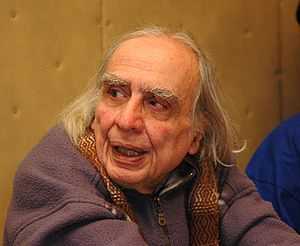Giwi Margwelaschwili

Giwi Margwelaschwili (Georgian: გივი მარგველაშვილი) (born December 14, 1927 in Berlin) is a German-language Georgian writer and philosopher.
He is the son of the notable Georgian intellectual Tite Margwelaschwili, who moved to Germany after the Red Army invasion of Georgia in 1921 and was chairman of the Georgian political emigre organization in Berlin. Due to allied bombing he attended three different gymnasium schools in Berlin and participated in the anti-Fascist youth movement Swing Kids.
After the war the family lived in Berlin-Wilmersdorf in the British sector of Berlin. In December 1945 Giwi and his father were abducted by the Soviet secret police NKVD and confined in the cellar of a Soviet commandantura in Berlin-Weissensee for six weeks. Subsequently he was detained in a Soviet Special Camp at Sachsenhausen. While his father was deported to Tbilisi and shot as a traitor after eight months of interrogation and torture, Giwi was released after 18 months in the camp. He was not allowed to return to West Berlin and moved to his relatives in Tbilisi.
Margwelaschwili learned Georgian and Russian, and graduated from high school. He studied English at the Tbilisi State University and was an aspirant for foreign languages. 1957-1970 he taught English and German at the Tbilisi Institute of Foreign Languages. In the 1950s, he composed his first novels and philosophic writings on phenomenology.[1]
In 1969, he was allowed to travel to East Germany as a translator for the Rustaveli Theatre for the first time since 22 years. In 1970 his first scientific work about "The role of the language in Heidegger's philosophy" was published. In 1971 he was appointed to the Institute of Philosophy at the Georgian Academy of Sciences and visited dissident and songwriter Wolf Biermann in Berlin. Due to that contact he was prohibited to leave the Soviet Union until 1987. In 1972 Giwi met Heinrich Böll, a Nobel laureate in literature from Germany, who was impressed by his unpublished autobiography Kapitän Wakusch. Böll tried to help him get a passport but was not successful.
In 1990 he settled in Berlin with the help of civil rights activist Ekkehard Maaß and was naturalized as a German citizen in 1994. In 1991 his first autobiographic work, Muzal. Ein georgischer Roman, was published in Germany. Several books followed, including novels, philosophic commentaries on Classical authors, and poems, which quickly won a nation-wide and international acclaim. Nevertheless, most of his work remained unpublished.
In 1995 he was awarded the Literature Prize of Brandenburg federal state. He became a member of the International PEN and received a scholarship of the President of Germany. The University of Bamberg appointed him professor for poetry. Berlin's Akademie der Künste decorated him with the Kunstpreis Berlin for his life's work. In 2006, the Goethe Institute awarded the prestigious Goethe Medal to him.[2] He has an honorary doctorate from Tbilisi State University.
He is married to the author and German philologist Naira Gelashvili. His daughter Anna is also a German philologist.
Works
- Margvelašvili, G. T.: Sjužetnoe vremja i vremja ekzistencii. Mecniereba, Tbilisi 1976
- Margvelašvili, G. T.: Aksiologiceskoe znacenie razlicija mezdu ekzistencialnym i kategorialnym v chaideggerovskom ontologiceskom ucenii. Mecniereba, Tbilisi 1979
- Margwelaschwili, Giwi: Kapitän Wakusch: autobiographischer Roman. vol. 1 In Deuxiland. Südverlag, Konstanz 1991, ISBN 3-87800-012-X
- Margwelaschwili, Giwi: Kapitän Wakusch: autobiographischer Roman. vol. 2 Sachsenhäuschen. Südverlag, Konstanz 1992, ISBN 3-87800-013-8
- Margwelaschwili, Giwi: Kapitani Vakusi. Kavkasiuri Saxli, T'bilisi N.N., ISBN 99928-71-67-9
- Margwelaschwili, Giwi: Die grosse Korrektur, vol. 1 Das böse Kapitel: Roman. Rütten & Loening, Berlin 1991, ISBN 3-352-00418-8
- Margwelaschwili, Giwi: Muzal: ein georgischer Roman. Insel-Verlag, Frankfurt a.M./Leipzig 1991, ISBN 3-458-16192-9
- Magwelaschwili, Giwi: Zuschauerräume: ein historisches Märchen. Autoren-Kollegium, Berlin 1991
- Margwelaschwili, Giwi: Der ungeworfene Handschuh: ontotextologische Versuche zur Abwehr von Schicksalsschlägen in Buch- und Gedichtweltbezirken. Rütten & Loening, Berlin 1992, ISBN 3-352-00437-4
- Margwelaschwili, Giwi: Leben im Ontotext: Poesie - Poetik - Philosophie. Federchen-Verlag, Neubrandenburg N.N. [1993], ISBN 3-910170-10-2
- Margwelaschwili, Giwi: Gedichtwelten - Realwelten. Arbeitsbereich Neuere Deutsche Literaturwissenschaft Otto-Friedrich-Universität Bamberg, Bamberg 1994
- Margwelaschwili, Giwi: Ein Stadtschreiber hinter Schloß und Riegel. Kurt-Tucholsky-Gedenkstätte, Rheinsberg N.N. [1995]
- Margwelaschwili, Giwi: Fenomenologiceskie kody soznanija. Centre for Cultural Relations of Georgia Caucasian House, Tbilisi 1998
- Margvelašvili, Givi: Ja - knižnyj personaž/Ich bin eine Buchperson. Centr Kulturnych Vzaimosvjazej Kavkazkij Dom, Tbilisi 1998
- Margvelasvili, Givi: Problema kulturnogo mira v ekzistencialnoj ontologii M. Chajdeggera. Centre for Cultural Relations of Georgia Caucasian House, Tbilisi 1998
- Margvelasvili, Givi: Mucali'. Diogene, Tbilisi 2001, ISBN 99928-59-93-8
References
- ↑ Anna-Teresa Tymieniecka (2002), Phenomenology World Wide: Foundations - Expanding Dynamics - Life-Engagements: A Guide for Research and Study, pp. 310-2. Springer, ISBN 1-4020-0066-9.
- ↑ Giwi Margwelaschwili. International Literature Festival, Berlin. Retrieved on April 13, 2007.
External links
- Giwi Margwelaschwili website
- Biography of Giwi Margwelaschwili
- Biography of Giwi Margwelaschwili (in German)
- Irene Langemann: Zwischen hier und dort: Der Schriftsteller Giwi Margwelaschwili (in German)
|